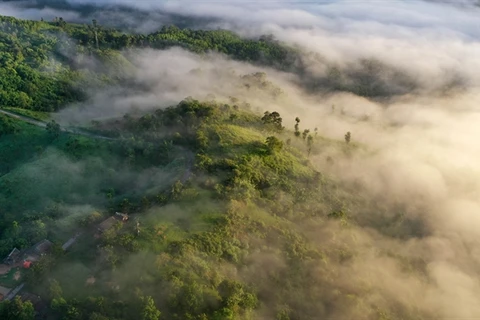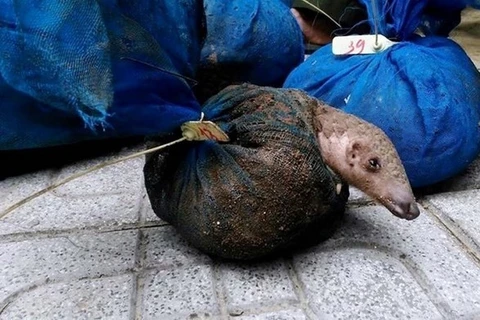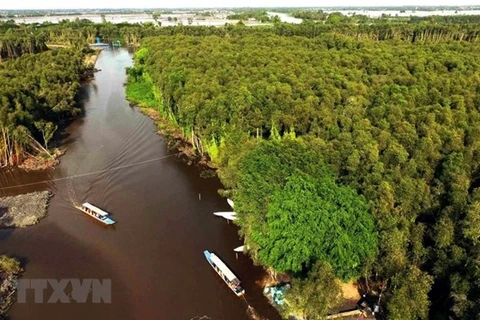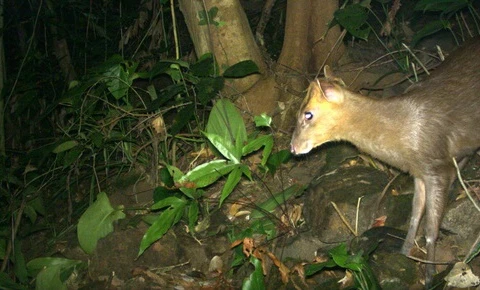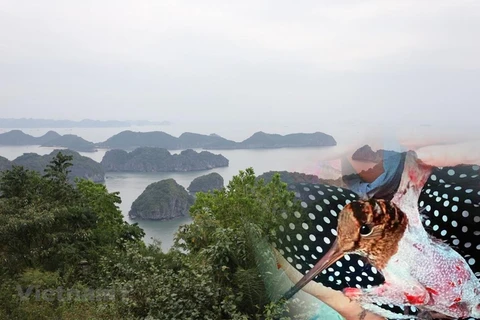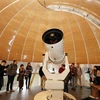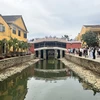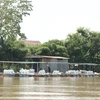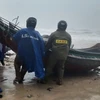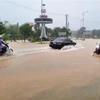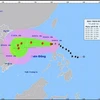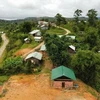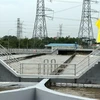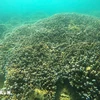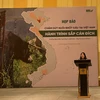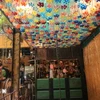Ninh Thuan (VNS/VNA) - The south central province of Ninh Thuan is stepping up efforts to conserve marine bio-diversity and seafood resources, which play an important part in its socio-economic development.
With its coastline of 105 kilometres, the province boasts a diverse range of high-value marine species such as fish, crustaceans, molluscs and corals.
Coral reefs and their eco-systems are among the most diverse, according to the provincial Department of Natural Resources and Environment, which has recorded six reefs with an average coverage rate of 42.6 percent in the province.
They include 344 species, including 46 found for the first time in the country.
The seas include 535 fish, 45 molluscs and 24 crustacean species among others.
The province’s 31,000ha Nui Chua National Park in Ninh Hai and Thuan Bac districts is one of the few places in the country where green sea turtles, loggerhead turtles and hawksbill turtles come every year to lay eggs.
The province has tied up with research institutes, universities and other domestic and foreign organisations to implement marine bio-diversity research programmes.
They include upgrading a geographic information system (GIS) for gathering, managing and analysing data about coral reefs and eco-systems near the coast, periodically inspecting coral reefs, exploring typical marine eco-systems in Ninh Hai and Thuan Nam districts, reviving saltwater mangrove forest eco-systems in Nui Chua and the Nai Lagoon to protect marine habitats.
The province has established a 7,352ha marine reserve area in the Nui Chua National Park to protect rare species.
Tran Van Tiep, Deputy Director of the Nui Chua National Park, said the park has worked with research units and organisations at home and abroad to explore and assess the park’s marine resources and build data about them to protect and revive eco-systems.
The park also has various programmes to protect sea turtles and other endangered species and their habitats, he said.
It has set up teams of volunteers to protect the turtles and rescue areas for marine species to live in natural conditions before being released into the wild, he said.
The park has stepped up advocacy activities to enhance people’s awareness of the importance and value of marine resources and ensure their participation in protecting the marine environment, he said.
To protect fisheries resources, the province has taken management measures and carried out advocacy activities to convince fishermen to only catch seafood during certain seasons, use regulated fishing nets and desist from using poisons, explosives and electricity to kill fish.
It releases millions of shrimp and fishes into the sea every year to regenerate seafood, including 700,000 black tiger shrimp so far this year.
But it faces challenges in protecting marine bio-diversity and fisheries resources since aquaculture and littering have polluted some places. Climate change has also affected its marine bio-diversity.
Tran Quoc Nam, Chairman of the provincial People’s Committee, said the province has identified preservation and proper exploitation of marine eco-systems and seafood resources as a priority to ensure socio- economic development.
To improve management of bio-diversity, the People’s Committee has assigned the Department of Natural Resources and Environment to periodically survey and assess the environment for drafting appropriate policies.
The province is developing polices and mechanisms to attract resources for enhancing marine conservation./.
With its coastline of 105 kilometres, the province boasts a diverse range of high-value marine species such as fish, crustaceans, molluscs and corals.
Coral reefs and their eco-systems are among the most diverse, according to the provincial Department of Natural Resources and Environment, which has recorded six reefs with an average coverage rate of 42.6 percent in the province.
They include 344 species, including 46 found for the first time in the country.
The seas include 535 fish, 45 molluscs and 24 crustacean species among others.
The province’s 31,000ha Nui Chua National Park in Ninh Hai and Thuan Bac districts is one of the few places in the country where green sea turtles, loggerhead turtles and hawksbill turtles come every year to lay eggs.
The province has tied up with research institutes, universities and other domestic and foreign organisations to implement marine bio-diversity research programmes.
They include upgrading a geographic information system (GIS) for gathering, managing and analysing data about coral reefs and eco-systems near the coast, periodically inspecting coral reefs, exploring typical marine eco-systems in Ninh Hai and Thuan Nam districts, reviving saltwater mangrove forest eco-systems in Nui Chua and the Nai Lagoon to protect marine habitats.
The province has established a 7,352ha marine reserve area in the Nui Chua National Park to protect rare species.
Tran Van Tiep, Deputy Director of the Nui Chua National Park, said the park has worked with research units and organisations at home and abroad to explore and assess the park’s marine resources and build data about them to protect and revive eco-systems.
The park also has various programmes to protect sea turtles and other endangered species and their habitats, he said.
It has set up teams of volunteers to protect the turtles and rescue areas for marine species to live in natural conditions before being released into the wild, he said.
The park has stepped up advocacy activities to enhance people’s awareness of the importance and value of marine resources and ensure their participation in protecting the marine environment, he said.
To protect fisheries resources, the province has taken management measures and carried out advocacy activities to convince fishermen to only catch seafood during certain seasons, use regulated fishing nets and desist from using poisons, explosives and electricity to kill fish.
It releases millions of shrimp and fishes into the sea every year to regenerate seafood, including 700,000 black tiger shrimp so far this year.
But it faces challenges in protecting marine bio-diversity and fisheries resources since aquaculture and littering have polluted some places. Climate change has also affected its marine bio-diversity.
Tran Quoc Nam, Chairman of the provincial People’s Committee, said the province has identified preservation and proper exploitation of marine eco-systems and seafood resources as a priority to ensure socio- economic development.
To improve management of bio-diversity, the People’s Committee has assigned the Department of Natural Resources and Environment to periodically survey and assess the environment for drafting appropriate policies.
The province is developing polices and mechanisms to attract resources for enhancing marine conservation./.
VNA

